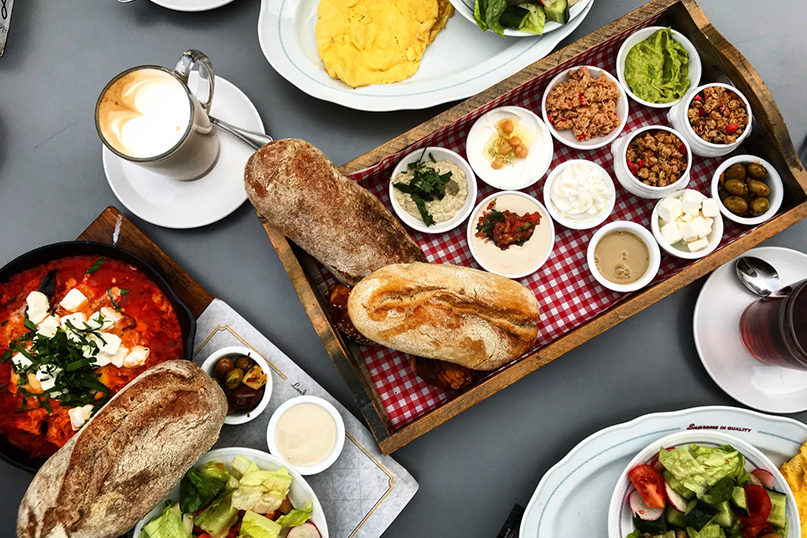
By Abigail Klein Leichman
Hummus, tomato-cucumber salad, extra-virgin olive oil … these and other staple foods on virtually every Israeli table undoubtedly helped propel the country to #1 on a new ranking of countries with the lowest rate of diet-related deaths worldwide and #10 on the 2019 Bloomberg Healthiest Country Index. And it will likely get even better after the Ministry of Health publishes its newest guidelines for healthful eating emphasizing the traditional “Mediterranean diet” approach that most Israelis already embrace.
That’s our first of 13 reasons you should eat like an Israeli.
1. Mediterranean diet
“The Mediterranean diet has the most evidence of being the ‘super diet,’ and it’s also sustainable especially if it’s local,” says Dr. Elliot Berry, professor emeritus of human nutrition and metabolism at Hebrew University Hadassah Medical School, and consultant to the United Nations and the Israeli Health Ministry. “The ministry’s new Mediterranean food pyramid recommends foods for optimal health including whole grains, wine in moderation, pomegranates, figs, walnuts and extra-virgin olive oil – more plant foods and less animal and highly processed foods,” Berry says.
2. Salad, salad, salad
Freshly chopped salad is the cornerstone of all Israeli meals. The most basic Israeli salad starts with locally grown cucumbers and tomatoes dressed with herbs, sea salt, extra-virgin olive oil (the only kind available in Israel) and squeezed lemon juice. Israelis also rely heavily on fruits and veggies: According to the Israeli Central Bureau of Statistics, as of the end of 2018, Israel’s 8.9 million residents each have access annually to an average 152 kilograms of fruit and 154 kg. of vegetables.
3. Big breakfasts
If you’ve ever enjoyed a traditional Israeli breakfast buffet, you know what we’re talking about. In addition to a huge variety of raw sliced vegetables and vegetable salads, you’ll find shakshuka (eggs poached in pepper-and-onion-studded tomato sauce), freshly baked breads, a large variety of cheeses, porridge and other warm delights to jumpstart your day. The benefits of a hearty breakfast have been proven in several Israel studies that reveal eating more in the morning and less in the evening suppresses blood-sugar surges, eases weight loss, and helps diabetics avoid insulin resistance.
4. Hummus, hummus, hummus
This delicious and nutritious creamy paste – based on protein-rich chickpeas, sesame tahini, sea salt and lemon juice – is not only for dipping here in Israel. A large plate of hummus garnished with olive oil and parsley, and often with whole cooked chickpeas, zaatar and extra tahini, is considered a perfectly satisfying meal, scooped up with chunks of warm fluffy pita bread. You can even find restaurants in Israel – called a hummusiya – that serve nothing but a large variety of hummus and accompaniments.
5. Tahini
Tahini (tahina to Israelis), simply ground sesame seeds, is not only an essential ingredient in hummus but has pride of place in Israeli cuisine as the basis of an all-purpose dip and dressing (think falafel, sabich or whole-roasted eggplant). Israelis import 50,000 tons of sesame seeds per year, consumed mainly in the form of tahini and hummus. Sesame seeds are rich in copper, manganese, calcium, phosphorus, magnesium, iron, zinc, molybdenum, vitamin B1, selenium and dietary fiber.
6. Pomegranates
The regal red pomegranate is one of the seven indigenous crops mentioned in the Bible and is a visual symbol of Israel itself. Pomegranate seeds guard against cancer and heart disease, boost immunity and reduce chronic inflammation. Gastric distress, hot flashes, hemorrhoids, conjunctivitis, osteoarthritis, hypertension and high cholesterol are some of the ailments pomegranate seeds are believed to ease. Pomegranate seeds are used in both vegetable and fruit salads, while pomegranate juice is popular for marinades and beverages.
7. Tomatoes
Israel is a powerhouse in breeding better tomatoes. Along with vitamins and minerals, tomatoes contain lycopene, a powerful antioxidant beneficial for the heart, blood pressure, prostate, bones and skin. Our bodies absorb lycopene best when tomatoes are consumed with something oily like olive oil or cheese.
8. Olive oil
Unrefined extra-virgin olive oil is the foundation of the Mediterranean diet. Often considered a fountain of youth, EVOO is a rich source of healthful monounsaturated fat, antioxidants, vitamins and minerals. In Israel, Leccino, Coratina, Koroneiki, Souri and other varieties are grown and bottled by both large and boutique brands, many of which regularly win national and international awards.
9. Dates and date honey (silan)
Israelis pop ’em like candies, stuff ’em with walnuts and use their silan (nectar) as a low-glycemic honey, straight up and in an endless assortment of stews, sauces, rubs and marinades. Dates protect against heart attack and stroke by lowering blood triglyceride levels; stabilizing blood pressure; and providing a good dose of antioxidants, vitamins A and B, protein and dietary fiber. Dates are truly “all natural” because they don’t need to be preserved with potassium sorbate or sulfur dioxide. Their high sugar content preserves them naturally.
10. Bamba
Bamba, Israel’s favorite packaged snack, is a processed food. But it belongs on this list because scientific studies have shown that the peanutty snack plays a key part in keeping Israeli children free of the peanut allergies that plague their peers in the West. Bamba contains 50% peanuts and is fortified with vitamins and minerals including folic acid and iron. And now you can buy this crunchy treat at major American retailers.
11. Eating seasonally
Unlike American supermarkets, in Israel much of the produce appears according to the local season. Nutritionists agree that produce retains more nutrients and flavor when it’s picked at the peak of freshness and quickly brought to market, rather than picked early and left to ripen on a long truck or boat journey. Local seasonal produce needs less human intervention (such as pesticides and coatings) and less fuel to get to consumers.
12. Communal meals
“The social aspect of eating is very important to health,” says Berry. “Communal meals are relaxed and convivial. Adults should involve the children, teaching them to make sensible choices within the Mediterranean framework, and showing them how to cook and cut salads.” The Israeli lifestyle features large Shabbat dinners, held sacred even in the least religious of Jewish families, as well as Passover seders, Rosh Hashana dinners and Yom Ha’atzmaut barbecues.
13. Forks over knives
Israel reportedly has the highest number of vegetarians and vegans per capita of any other country, and the latest research indicates this plant-based trend contributes to the country’s overall good health. Consuming more fruits, veggies and whole grains, but less meat, is one of four factors (along with not smoking, staying lean and exercising 30 minutes daily) that “may help prevent – and in some cases even help treat or reverse – every single one of our 15 leading causes of death.








 Southern New England Jewish Ledger
Southern New England Jewish Ledger







